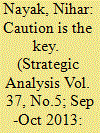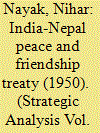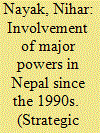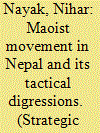| Srl | Item |
| 1 |
ID:
123312


|
|
|
|
|
| Publication |
2013.
|
| Summary/Abstract |
Pushpa Kamal Dahal, alias Prachanda, made the trilateral proposal during his official visit to India in April 2013. This was the third time since 2010 that Prachanda had raised this issue. This concept seems to be a modified version of his earlier 'equidistance policy', which was declared after he became prime minister in September 2008. He proposed trilateral cooperation for the first time in October 2010 after visiting Beijing. He reiterated it after signing a Memorandum of Understanding (MoU) with the Asia Pacific Exchange and Cooperation Foundation (APECF) for development of Lumbini in November 2012 in Shanghai. He again proposed the same during his April 2013 visits to both Beijing and New Delhi. The fact of the matter is that he has reiterated this proposal each time he has returned from a visit to China. This time, in fact, he also discussed the issue directly with the Chinese president Xi Jinping. In response, Jinping first suggested working on bilateral projects: 'We [Nepal and China] can discuss later what projects can be implemented jointly by China, Nepal and India'.
|
|
|
|
|
|
|
|
|
|
|
|
|
|
|
|
| 2 |
ID:
097317


|
|
|
|
|
| Publication |
2010.
|
| Summary/Abstract |
The Treaty of Peace and Friendship signed between India and Nepal in 1950 has been a subject of debate within Nepal. The issue has been regularly featured in left parties' election manifestos in Nepal and become an agenda item in bilateral talks. India has agreed to review, adjust and update the treaty while giving due recognition to the special features of the bilateral relationship. Nepal's reservations to the treaty are based on the argument that the treaty compromises Nepal's ability to pursue an independent defence and foreign policy. The article examines the relevance of the treaty and prospects of India-Nepal relations in the changing international scenario. It argues that Nepal has benefited much more than India from the treaty. However, considering changes in strategic equations in the region, India-Nepal bilateral relations must be remodelled into a strategic partnership that seeks to promote security, modernisation and prosperity.
|
|
|
|
|
|
|
|
|
|
|
|
|
|
|
|
| 3 |
ID:
084891


|
|
|
|
|
| Publication |
2009.
|
| Summary/Abstract |
Nepal being a poor landlocked country with a fragile and unstable political system, major external powers providing aid and assistance to Nepal tend to carry an influence on domestic politics, foreign policy, and the socio-economic agenda of the government. These powers have divergent interests and do not coordinate their policies towards Nepal. While some external forces like the United States and China have hidden political and strategic interests, some others like the European Union are engaged in humanitarian issues. There is no unanimity amongst them regarding what kind of political transformation they should endorse or disown to find a solution to the decade-long conflict. Thus, instead of playing a constructive role, these external forces sometimes complicate the process of peace and reconciliation taking shape in Nepal today.
|
|
|
|
|
|
|
|
|
|
|
|
|
|
|
|
| 4 |
ID:
105632


|
|
|
|
|
| Publication |
2011.
|
| Summary/Abstract |
This article examines the different narratives on the 'Madhes' identity, and situates this discourse in the ethno-linguistic mosaic of the Terai region as well as the larger Nepali political scenario, by identifying the reasons for their increasing assertiveness in politics. The paper argues that exploitation and discrimination by the upper-caste Pahadi migrant communities (especially during the monarchy period) and the Nepali state has played an important role in the consolidation of the Madhesi identity. While the mainstream Madhes parties have adopted a soft stand on the issue, the armed groups are demanding outright 'independence'. Of late, the Madhesi movement has suffered because of differences (over objectives as well as methods) between various Madhes groups. The fragmentation of the movement has also dragged India into controversy. Both Pahadi and Madhesi groups are critical of the role played by India and this is likely to affect India's security and economic interests in Nepal.
|
|
|
|
|
|
|
|
|
|
|
|
|
|
|
|
| 5 |
ID:
068118


|
|
|
| 6 |
ID:
079862


|
|
|
|
|
| Publication |
2007.
|
| Summary/Abstract |
King Gyanendra's takeover of absolute political power in February 2005 paved the way for the Maoists of Nepal and the political parties to fight together for democracy. In signing the 12-point agreement with the Seven Party Alliance (SPA), the Maoists even changed their strategy from a revolutionary agenda to a democratic one. The paper argues that the Maoist departure from the classical resistance model to the path of negotiation was tactical, to overcome the constraints on their way forward. However, the SPA and the Maoists have several issues to settle for making the experiment a success. If this accord fails, Nepal might face a fresh round of conflict and the monarchy might get another chance to dominate the polity.
|
|
|
|
|
|
|
|
|
|
|
|
|
|
|
|
| 7 |
ID:
081471


|
|
|
|
|
| Publication |
2008.
|
| Summary/Abstract |
Links between Nepalese Maoists and Indian Maoists started in 1995 and have grown subsequently. During the initial stages of their collaboration, the Nepalese Maoists sought strategic and material support from their Indian counterparts. Later, differences emerged over the introduction of 'prachandapath'. However, links continued at the ideological level, confined to debate and discussions on the nature of revolution and State. The decision of Nepalese Maoists to join democratic forces in an alliance and participate in mainstream politics in November 2005 was criticized by the Indian Maoists. This article argues that in spite of their differences, these outfits may come together in the future, irrespective of the success or failure of the Nepalese Maoists to secure their hold on power after the upcoming elections
|
|
|
|
|
|
|
|
|
|
|
|
|
|
|
|
| 8 |
ID:
071025


|
|
|
| 9 |
ID:
089918


|
|
|
|
|
| Publication |
2009.
|
| Summary/Abstract |
Integration of Maoist combatants into the Nepal Army (NA) has become a contentious issue. Although the stakeholders have agreed on the integration process, they are yet to arrive at a consensus on how to attempt it. They have changed their positions frequently over the issue, which has complicated matters further. The NA holds the view that the lack of conventional training of Maoist combatants, as well as their ideological orientation, would have a serious effect on its professional standards. The Maoists argue that soldiers should possess military skills rather than academic qualifications, and claim equal positions in all ranks and file of the NA. Moreover, the process of disarmament of the People's Liberation Army is not complete and this is likely to pose a critical challenge to the integration process. This article argues that Nepal should learn lessons from the South African experience and adopt a civilian integration model, which can accommodate more ex-combatants, rather than focus merely on military integration. Since the Maoists have a long-term plan to reduce the NA's strength, civilian integration would be more appropriate than military integration.
|
|
|
|
|
|
|
|
|
|
|
|
|
|
|
|
| 10 |
ID:
115883


|
|
|
|
|
| Publication |
2012.
|
| Summary/Abstract |
The objective of this article is to critically analyse the discourse within the Unified Communist Party of Nepal (Maoist) or known as UCPN (Maoist) since its evolution and find out whether the Maoists have adapted themselves to the democratic process well by using democracy as a tool to achieve their own revolutionary political objectives. The article argues that the internal Maoist discourse reflects that there is no change in the UCPN (Maoist) strategy or political goals. They have only changed their tactics to suit the situation. The changes are also more visible at the organisational rather than the ideological level. Since the party is in transition, they may not opt for another round of violent revolution to achieve their political objectives; they will try their best to achieve them through peaceful means. Since the party has already experimented with the radicals' ideas in 2004-2005, the top leaders will be extra careful in the future about letting the radicals dominate the party.
|
|
|
|
|
|
|
|
|
|
|
|
|
|
|
|